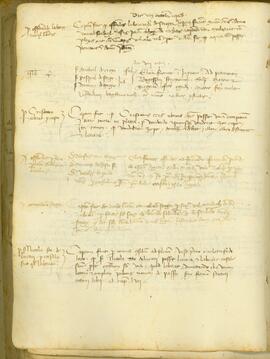Področje identitete
Signatura
Naslov
Datum/-i
- 1415-1652, 1656-1809 (Ustvarjanje)
Nivo popisa
Serija
Obseg in nosilec zapisa
117 volumes; textual records
Področje konteksta
Ime ustvarjalca
Zgodovina arhivskega gradiva
Neposreden vir, od katerega se gradivo prevzema ali prenaša
Področje vsebine in strukture
Obseg in vsebina
The series contains the decisions of the Minor Council made in the period from the beginning of the 15th to the beginning of the 19th century. With the cessation of Venetian rule in 1358, the Minor Council and the Rector lost much of their authority. Since then, the Council had mostly dealt with cases related to communal life, that is, it would resolve current affairs that should not burden either the Senate or the Major Council. From today's point of view, it could be said that the Minor Council had executive authority. The Rector, whose mandate lasted only one month, was at the head of the Minor Council and he presided over both the Senate and the Major Council. The Minor council headed by the Rector represented the Republic and held audiences with ambassadors from foreign countries. In cooperation with the Senate, the Minor Council oversaw all correspondence with the consuls of the Dubrovnik Republic, ambassadors (poklisari) and other diplomatic and consular representatives of the Republic in foreign countries, mostly in the Ottoman Empire and in the countries of the Apennine Peninsula. The Minor Council was also in charge of issuing letters to foreign rulers and other dignitaries.
The series contains a lot of information about Jewish people. The data are very important to analyse the attitude of the Dubrovnik Republic towards Jews. The series also provides a large quantity of data to learn about their private lives, as well as about the business of Jewish merchants. In addition, the series is extremely important for the research of private and business lives of Jewish women. The first information about Jews in this series dates to the 20s of the 14th century with, for example, a reference about a Jew by the name of Chrisomus who sold a bell and some copper in Dubrovnik (1428; vol. 4, f. 192v). Bandit attacks on Jews who travelled to Dubrovnik using the ships of the Republic and, most likely, intended to go this way to the Ottoman Empire, at the end of the 15th century, are referenced many times. There are many references in this series to well-known figures from the Sephardic world some of whom only passed through Dubrovnik, and some lived there such as Gracia Mendez and her business representatives Abner Alfarin and Isac Ergas, physicians Amatus Lusitanus, Abraham and his son-in-law Joseph Salama, a poet Didacus Pyrhhus, a merchant Daniel Rodrigues (16th century), a rabbi Aron Cohen (17th century), and a merchant Raphael Cohen (18th century). The series also contains information about sending Jewish physicians, especially Abraham and Joseph Salama, to the courts of Ottoman dignitaries in Bosnia and Herzegovina. Through the decisions of the Minor Council, we can, for example, follow the destiny of the members of the Dubrovnik Jewish community during the court trial against a Jewish merchant Isaac Jeshurun, accused of a ritual murder of a girl from Dubrovnik (1622). If in fear for their own lives, many Jews were allowed to leave Dubrovnik with a special permission of the Minor Council. The series also contains many documents in which free arrival and limited stay to Jewish merchants who were in debt were granted (Lat. salvus conductus). This council would also issue permits for construction projects in the ghetto and for housing purposes outside the ghetto. Occasionally, the Minor Council would also make decisions on the obligation imposed upon Jews to wear a special sign. The series mentions many Jewish women, most often widows, who were given permission by the Minor Council to perform certain legal work with the consent of their guardians. Most often, these were women who wanted to appoint a certain person to represent them to conduct business either in the Dubrovnik Republic or in another country.
Vrednotenje, uničenje in načrtovanje
Dodatno pridobivanje gradiva
Sistem ureditve
Pogoji dostopa in uporabniškega območja
Pogoji, ki urejajo dostop
Pogoji, ki urejajo reproduciranje
Jezik gradiva
Pisava gradiva
Opombe o jeziku in pisavi
Fizične značilnosti in tehnične zahteve
Pripomočki za uporabo
Građa za generalni katalog Državnog arhiva u Dubrovniku, box 3, folder 8. Josip Gelčić, »Catalogus i. r. Archivii Ragusini.« Glasnik Zemaljskog muzeja u Bosni i Hercegovini 22 (1910): 537-588. Index partium Minoris Consilii ab. a. 1783. (d. 2. Junii) ad a 1790 (HR-DADU-4.1, vol. 116). Riccordanze dei Signori Consiglieri dell’ Illustrissimo Minor Consiglio 1608. a quei dell’anno 1686. (HR-DADU-4.1, vol. 117). Istruzioni per i Magistrati per procedere a norma degli Statuti e delle antiche consuetudini (HR-DADU-14.1, vol. 16).
Območje združenih gradiv
Obstoj in lokacija izvirnikov
Obstoj in lokacija kopij
Sorodne popisne enote
Opomba o objavi
Konstantin Vojnović, »O državnom ustrojstvu republike dubrovačke.« Rad JAZU 103 (1891): 24-67. Ilija Mitić, Dubrovačka država u međunarodnoj zajednici (od 1358. do 1815) (summary: The Dubrovnik State in the International Community (from 1358 to 1815), Zagreb: JAZU - Nakladni zavod Matice hrvatske, 1988. Jorjo Tadić, Jevreji u Dubrovniku do polovine XVII stoljeća (résumé: La Communauté Juive de Dubrovnik), Sarajevo: La Benevolencia, 1937. Miroslav Pantić, »Izbor dokumenata o dubrovačkim jevrejima od sredine XVII do kraja XVIII veka.« Zbornik Jevrejskog istorijskog muzeja 1 (1971): 341-402. Vesna Miović, Židovke u Dubrovačkoj Republici (summary: Jewish Women in the Dubrovnik Republic), Zagreb-Dubrovnik: HAZU Zavod za povijesne znanosti, 2013. Zdenka Janeković-Römer, The Frame of Freedom. The nobility of Dubrovnik between the Middle Ages and Humanism, Zagreb - Dubrovnik: Zavod za povijesne znanosti HAZU u Dubrovniku, 2015. Vesna Miović, Židovski rodovi u Dubrovniku (1546-1940) (summary: Jewish Families of Dubrovnik (Ragusa), 1546-1940), Zagreb-Dubrovnik: Zavod za povijesne znanosti HAZU u Dubrovniku 2017.
Področje opomb
Alternativen/-ni identifikator/-ji
Old reference code
Gesla
Nesnovna gesla
Krajevna gesla
Imenska gesla
Gesla glede spola
Območje nadzorovanega opisa
Identifikator popisa
Identifikator ustanove
Uporabljena pravila in/ali dogovori
Status
Stopnja podrobnosti
Datumi nastanka, popravljanja in izbrisa
2021
Jezik/-i
- angleščina

